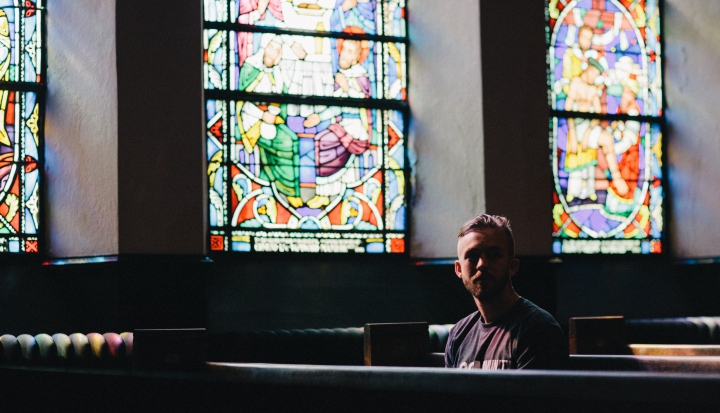When weepy Mexican women embrace you in a small, dimly lit chapel, it’s hard to find appropriate words to greet their emotion. And when you speak broken-at-best Spanish, finding those words proves to be, well, impossible.
In July 2016, I sat among a dozen parishioners at the Dolores Mission Church in one of the roughest, most gang-ridden neighborhoods in Los Angeles. Father Ted Gabrielle, pastor of the mission, dedicated the early afternoon Mass to deported veterans.
Five days before that Mass, I had flown to southern California from Chicago on assignment. An untold number of U.S. military veterans have been deported from the United States. My project was to meet their families and tell the story of deported veterans through the eyes of the daughters, siblings, and parents left behind in places like San Diego and Los Angeles.
But conceiving a good story is often a good story in itself. My exposure to deported veterans dates back to 15 months before I got the assignment. Ultimately, through a series of providential encounters, this is how I learned my profession might actually be my vocation.
I first visited the Dolores Mission Church in March 2015, where I met Father Ted Gabrielle for the first time. I was volunteering with a group of students from Carroll College in Helena, Montana. On the final day of our service Father Ted rounded us up and spoke about the mission, the city, and the plight of many immigrants in southern California. He made an offhand comment about a community of deported U.S. veterans who live in Tijuana.
Deported veterans? It sounded like an oxymoron. Incredulous, I couldn’t believe this country would actually deport men and women who risked their lives defending it—Father Ted must be wrong.
Half skeptical, half disturbed, I made a note and I swore that if I one day had an opportunity, I’d look into the story as a journalist. Seventeen months later while working on my master’s degree in journalism, I learned that hundreds, if not thousands, of U.S. veterans have been deported, leaving families behind to endure emotional and financial hardship. So I booked a ticket back to California.
I spent the week reporting on two daughters and their father, Enrique Salas, a twice-deported Marine who struggles to maintain a connection with his family in San Diego. I tracked down the story of three brothers: the oldest dead, the youngest living outside San Diego, and the third, a dishonorably discharged Marine, banished to Tijuana.
Then, in Compton, I met Margarita Barajas, a 65-year-old immigrant whose son, Hector, was deported after serving in the Army. I sat at her bedside as she confessed, tears streaming down her cheeks, that she fears she’ll never see Hector return to the United States to rejoin his family and care for his 11-year-old daughter.
I listened and asked only a few questions. “Para el gobierno, los veteranos son como basura”—for the government, the veterans are like trash—she told me. I was struck by her emotion and startled by the pain families like hers experience. I grew even more motivated to share her story.
I called Father Ted and he invited me to swing by at the end of the week. So I returned to that small chapel whose near-empty pews held a devout handful of Friday afternoon worshipers. The Mass was said in Spanish, and while I solo hablo un poco espanol, I understood Father Ted when he dedicated the service to all deported veterans and their families. He told the congregation who I was—a young guy who served at Dolores and had returned as a journalist.
When Mass ended, the tearful Mexican women descended, forming a line to hug me. In response, I held a few hands and, lacking any trace of nuance, mumbled “Gracias” repeatedly. Stunned and overwhelmed by the grace of that moment, I felt God’s presence in the chapel and God’s embrace through each woman.
I suspect, I imagine, well okay, I believe that God brought me back to Dolores Mission in July 2016 with specific intention. God introduced me to Margarita Barajas in Compton so that I would return to Dolores, and God reintroduced me to Father Ted so that I might understand that journalism is my vocation.
Journalism provides an opportunity for reporters to illuminate oft-neglected corners of the world. And, through careful discernment, reporters can listen for God’s call and pursue stories we need to tell.
Since returning from Los Angeles, practicing journalism has led me to find several more stories, many of which resonate with the vocation I discovered last July.
In October I found a cemetery in New Hampshire with more than 700 nameless graves and tried to return some humanity to the souls a small town had forgotten. A few months later, outside of St. Louis, I wrote about a parish and a struggling suburb uniting to provide affordable housing for senior citizens. And, most recently, I wrote about an 82-year-old whose spirituality is sustaining him as he hikes the Appalachian Trail.
I am confident that as I grow in my faith and develop as a journalist, God will lead me to and help me tell more stories. And I pray that God will be revealed to me through the many stories this world offers.
This is part three of a three-part series of essays by journalists on why their profession is also their ministry. You can read the other two essays here and here.
Image: Karl Fredrickson on Unsplash














Add comment